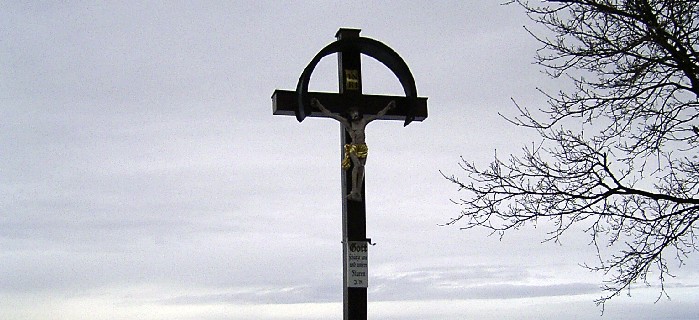The Crucifixion of Jesus in Islam
In their assessment of the crucifixion of Jesus there are major differences between Islam and Christian beliefs. Whereas the Bible regards the crucifixion and resurrection, that is to say Jesus’ work of redemption and reconciliation, as the central theme of the Christian faith (see 1Cor. 15:12ff.), in the Koran this event plays only a very minor role. The Koran contains just one somewhat obscure verse about the crucifixion, which is interpreted in different ways by Muslim theologians. In all these differences, however, Muslim theology agrees on one point – that the crucifixion of Jesus as reported in the gospels could never have taken place.
crucifixion and resurrection, that is to say Jesus’ work of redemption and reconciliation, as the central theme of the Christian faith (see 1Cor. 15:12ff.), in the Koran this event plays only a very minor role. The Koran contains just one somewhat obscure verse about the crucifixion, which is interpreted in different ways by Muslim theologians. In all these differences, however, Muslim theology agrees on one point – that the crucifixion of Jesus as reported in the gospels could never have taken place.
The Crucifixion in the Koran
Sura 4: 157+158 says concerning the Jews (The texts in brackets are additions of the translator R.Paret): “…and (because they) said: ‘We have killed Christ Jesus, the Son of Mary and Messenger of God’ – But they (in reality) did not kill him and (also) did not crucify him. Rather (another) similar appeared to them (so that they mistook him for Jesus and killed him)…And they did not kill him with certainty (i.e. they could not say with certainty that they killed him). No, God raised him to himself (in heaven).”
Interestingly the Koran does not address at all the meaning of the crucifixion as an act of redemption.
Sura 4:157-158 is just so ambiguous in Arabic that Muslim scholars – especially from the 19th century onward – have considered several interpretations:
- Nobody was crucified: Then the verse would mean that the Jews indeed planned to crucify Jesus but “it only appeared so to them, as if” the crucifixion of Jesus had actually taken place. Some Muslim interpreters, with recourse to the historical critical method of biblical interpretation, hold the view that on the basis of the darkness and the earthquake in the biblical account, Jesus escaped his execution and was taken up to heaven by God in good time.
- Jesus was indeed crucified, but according to God’s plan and not because of the plans of the Jews: From the wording one could accept that Jesus was crucified, but not because the Jews intended it but, in the final analysis, because God had so decided. The emphasis would then be: “They did not kill him” (but God was responsible for his death). However, this is only a minority view in Muslim theology today.
- Another person was crucified instead of Jesus: Then the interpretation would read: “He, Jesus, so appeared to them as if he was crucified,” which meant that Jesus himself was not crucified but another person was mistaken for Jesus unintentionally (the view of Mohammed Taufîq Sidqî or the Schiite theologian Mohammed Husain Tabâtabâ’î), or that God changed someone else into Jesus, who then was crucified in his place.
This is the view most commonly held in the Islamic world today. There are many opinions as to who was crucified instead of Jesus; most though name Judas as the one who deserved the punishment of crucifixion for betraying Jesus. That is also the position taken in the so called “Gospel of Barnabas”, a false European gospel dating from the 14th – 16th centuries. It claims to be the only true gospel of Jesus Christ, but pointedly opposes biblical teaching and supports many Muslim points of view. Muslim theologians have many other theories about the identity of the victim crucified, for example, that Peter volunteered as a ‘substitute’ when Jesus promised him a place in paradise in return. Simon of Cyrene who carried Jesus’ cross has also been considered. Other suggestions include one of Jesus’ watchmen, someone God created at that moment, Satan, Jesus Barabbas, a Jewish rabbi or a Roman soldier.
In any case, in the modern era the substitution theory, the view that someone else was crucified in place of Jesus, prevails in the Muslim interpretation of the Koran. Because of the God made “Likeness”, this substitute was taken for Jesus so that the bystanders really believed they had crucified Jesus himself. Then Jesus was taken up alive into heaven either spiritually or bodily and spiritually.
Muslim Arguments against the Crucifixion
Although the exact meaning of the crucifixion verse in the Koran must ultimately remain obscure, most Islamic theologians understand the verse to be a clear negation of the crucifixion of Jesus. The following arguments would speak against Jesus’ crucifixion:
- Crucifixion means defeat: With it Jesus’ mission would be seen as a failure – deserted by his disciples; betrayed by Judas; denied by Peter; Jesus dying without any visible success i.e. many conversions or the establishment of a world empire.
- Crucifixion means shame: Jesus’ execution on the cross would not be appropriate for such an esteemed prophet, but only for a sinner or criminal.
- The Bible does not support the crucifixion either: Muslim theologians have used European representatives of the historical critical interpretation of the Bible, especially since the 19th century, as providers of proof for their view of the implausibility of the crucifixion.
- The crucifixion and substitutionary atonement are intellectual nonsense: The idea that the death of a man (that is how the Koran describes Jesus) could achieve anything for someone else is incompatible with human reason. What makes the matter even more implausible is that Jesus, an innocent man, suffered.
- The idea of crucifixion comes originally from pagan religions: Leading Muslim apologists like the Cairo religious scientist and lawyer Mohammed Ab Zahra (1898-1974) or the Cambridge doctor of history and religious science Ahmad Shalabî have argued that teachings like the Trinity, divine sonship and redemption were not originally Christian teachings. They were first adopted by Paul, the “Destroyer of Christianity”, from the Roman-pagan environment and from the religions of Tibet, Nepal or India after the death of Jesus.
You can quote or use this essay on the condition that you do not change the content and acknowledge the author: www.orientierung-m.de

